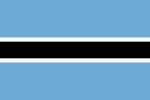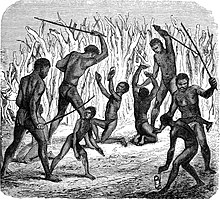Religion in Botswana
Religion in Botswana (Pew Research)[1]

| Part of a series on the |
| Culture of Botswana |
|---|
 |
| People |
| Languages |
| Cuisine |
| Religion |
| Art |
| Literature |
| Music |
| Sport |
Botswana is a Christian majority nation. However, the country is officially secular and allows freedom of religious practice.
A country of an estimated 2.26 million people in 2015,[2] Christianity arrived in Botswana in mid 1870s, with the arrival of Christian missionaries. The conversion process was quicker than neighboring southern African countries because regional hereditary tribal chiefs locally called Dikgosi converted to Christianity, which triggered the entire group they led to convert as well.[3]
History
Before the arrival of Christianity, Animism was the prevailing belief system of the country.[citation needed]
The London Missionary Society sent the first Christian missionaries to Botswana in 1812. Other missionary groups were restricted by Motswana chiefs to avoid religious conflict.[4] The missionaries were welcomed because the tribal chiefs believed they would help source guns to resist Afrikaner trekkers from south and to prevent other nations from taking power in the region.[3] The BaNgwato and BaNgwaketse tribes were the first to wholly adopt Christianity in the 1890s and 1900s, and their respective chiefs banned several tribal practices that contradicted Christian teachings.[4]


After the arrival of Christianity in Botswana, the missionaries established Bible schools and attempted to end old practices such as Bogwera (the tribe's traditional initiation ceremony into manhood) and Bojale (a girl's initiation ceremony into womanhood after she reached puberty), both of which were traditionally linked to the social acceptance of someone's readiness to marry as well the right to inherit property.[citation needed] These practices continued to exist in private, despite missionary efforts to end them.[3] The Christian missionaries were politically involved as interpreters between the tribal chiefs and the colonial administrators.[5]
After Botswana gained independence in 1966 from the colonial rule, senior Christian mission officials and priests served as the first Speaker of the National Assembly and as officials in the new government.[5] In 1970s, its new leaders reviewed the Christian colonial curriculum in schools, and revised it in order to restore traditional values based on pre-Christian religious ideas, such as Kagisanyo and Botho, respectively harmony and humanism.[3][6] Bogwera and Bojale were re-introduced.[3] The new leaders also adopted a policy of religious tolerance and freedom, an approach towards religion that continues in Botswana in the 21st century.[7] However, the school curriculum remains largely as before, with Christian terminology and ideologies.[3]
Demographics
An estimated 70 percent of Botswana citizens in 2001 identified themselves as Christians.[7] In 2006, a report published by the Botswana government said that:
- 63 percent of its citizens were Christians of various denominations,[This is inconsistent with the pie chart above. We shouldn't present conflicting information without an explanation.]
- about 27 percent said their religion was "God",
- about 8 percent claimed to have no religion,
- 2 percent were adherents of the traditional indigenous religion Badimo, and
- all other religious groups (Buddhism, Hinduism (0.3%), Islam (0.4%), Judaism, and others) were less than 1 percent of Botswana's population in total.[8][9]
Religions
Christianity
Christianity is the majority religion in Botswana. As of 2001, approximately 70 percent of Batswana were Christians.[7] Christian churches in Botswana include the mainline churches created by missionaries, African-initiated churches created independently by Batswana, and Evangelical and Pentecostal churches.[4]
Christian missionaries first arrived in Botswana in 1812, and Christianity was widely adopted during the colonial period of the Bechuanaland Protectorate.[4]
Botswana recognises only Christian holidays as public holidays. The nationwide religious observations include Good Friday, Easter Monday, Ascension Day, and Christmas.[7][8]
Islam
Islam is a minority religion in Botswana. It came to the country through Muslim immigrants from South Asia, who settled in the area during the British colonial rule. According to the 2001 census, there are around 5,000 Muslims in Botswana,[10] which is less than 1 percent of the population.
The Shia population in Botswana is estimated between one and three percent of the total Muslim population of Botswana; according to Pew Forum it is less than one percent[11] while as per Ahl al-Bayt World Assembly the population of Shia in Botswana is around two percent of the total Muslim population of Botswana.[12]
Indian Muslims were the first Islamic populations in Botswana when they arrived around the 1890s. These Indian Muslims were limited to urban areas by the colonial authorities. Within some brief time, Muslims established Islamic centres throughout one urban centre to another as cities and Muslim populations increased.[13]
Malawian Muslims began to appear around the 1950s in Francistown. They arrived mainly for job opportunities like mining.[13]
There were very few conversions to Islam until the 1970s. Shaykh Ali Mustapha of Guyana has proselytised in Botswana since the 1970s, where missions are concentrated in townships and prisons.[13]
Gaborone is considered the heart of Botswanan Islam with a modernised mosque being built in 1982.[13]
Freedom of religion
The constitution of Botswana protects the freedom of religion and allows missionaries and proselytisers to work freely after they register with the government, but forced conversion is against the law. There is no state religion in Botswana.[7][8]
See also
- Badimo
- Bahá'í Faith in Botswana
- Botswana Council of Churches
- Christianity in Botswana
- Freedom of religion in Botswana
- Hinduism in Botswana
- Irreligion in Botswana
- Islam in Botswana
References
- ^ Pew Research Center's Religion & Public Life Project: Botswana. Pew Research Center. 2010.
- ^ World Bank Group (2016-09-19). "Botswana". World Bank Group. Retrieved 2016-10-18.
- ^ a b c d e f Sharlene Swartz; Monica Taylor (2013). Moral Education in Sub-Saharan Africa: Culture, Economics, Conflict and AIDS. Routledge. pp. 67–69. ISBN 978-1-317-98249-4.
- ^ a b c d Haron, Muhammed; Jensen, Kipton E. (2008). "Religion, identity and public health in Botswana". African Identities. 6 (2): 183–198. doi:10.1080/14725840801934039. ISSN 1472-5843.
- ^ a b Elias Kifon Bongmba (2015). Routledge Companion to Christianity in Africa. Routledge. pp. 389–390. ISBN 978-1-134-50577-7.
- ^ Kevin Shillington (2013). Encyclopedia of African History. Routledge. pp. 163–164, 129. ISBN 978-1-135-45670-2.
- ^ a b c d e International Religious Freedom Report 2007: Botswana. United States Bureau of Democracy, Human Rights and Labor (September 14, 2007). This article incorporates text from this source, which is in the public domain.
- ^ a b c U.S. Department of State (2016). "International Religious Freedom Report for 2015, Country Report: Botswana". Retrieved 2016-10-18.
- ^ Pew Research Center (2012). Religious Composition by Country: Global Religious Landscape (PDF). PRG, Washington DC.
- ^ "Botswana. International Religious Freedom Report 2007". U.S. Department of State. 14 September 2007. Retrieved 2010-01-19.
- ^ "Estimated Percentage Range of Shia by Country" (PDF). Pew forum. Archived from the original (PDF) on 1 August 2012. Retrieved 30 July 2013.
- ^ "Shia Population in: Botswana". The AhlulBayt World Assembly. 8 April 2010. Retrieved 1 August 2013.
- ^ a b c d Tayob, Abdulkader (1999). "Southern Africa". In Westerlund, David; Svanberg, Ingvar (eds.). Islam Outside the Arab World. London: Routledge. p. 113. ISBN 0-7007-1124-4.

